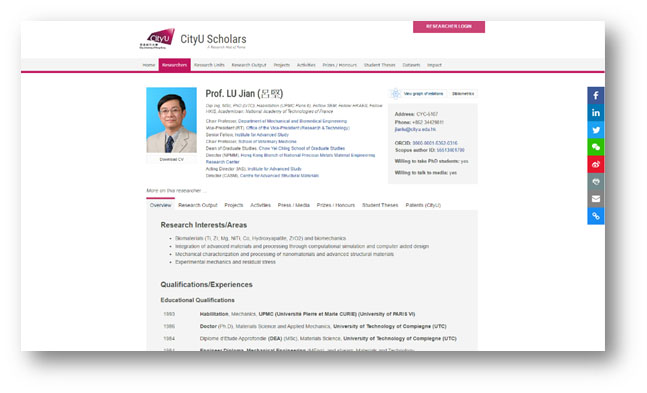CityU Scholars: The New Integrated Research Intelligence Solutions of the University
by CityU Scholars Project Team
Background
Research is one of the key output of a research-based institution like CityU. It is playing not only an important role in raising the ranking and branding of the institution but also as a way to attract talented students and researchers to join the big family. Showcasing our excellent research output and researchers to the public is, therefore, vital to the University.
In the past, research information is often fragmented across various systems and spreadsheets within the University. This leads to administrative overheads and duplication of researchers’ effort in entering their research outputs in each and every system, inducing inconsistent and incomplete data as well as unreliable reports on a less timely basis. Therefore, building a new research management system is essential to the University.
What is CityU Scholars?
CityU Scholars, the new integrated research intelligence solutions of the University, aggregates CityU's research information from numerous internal and external sources, and ensures the data that drives our strategic decisions is trusted, comprehensive and accessible in a central repository that provides a single source of truth on a timely basis.
CityU Scholars is also bundled with a searchable web portal that showcases our excellent researchers to the public with their research output, patents, projects, research activities, prizes/honours, student theses, datasets, and impact. Moreover, it is highly integrated with various external systems, including Elsevier’s Scopus®, Altmetric, addThis, handle.net and more, to form the most comprehensive research portal yet. As an example, below is the web portal showcasing Professor Jian Lu:

As a highly versatile centralized system, CityU Scholars enables us to build reports, carry out performance assessments, manage researcher profiles, enable research networking and expertise discovery and more, all the while reducing the administrative burden for researchers, supporting staff as well as senior management.
Benefits for Different Stakeholders
With such a great research management system, CityU Scholars provides many benefits to different stakeholders in CityU:
For Administrative Units
It saves a lot of administrative work in collecting, verifying and consolidating research information from various departments. It also helps to ensure the data accuracy. The research data is immediately available in the system and therefore, administrative units can generate different kinds of operation reports based on the latest information. It improves the overall productivity of those involved in administrative units.
For Researchers
Researchers can avoid repeatedly entering similar research information for different purposes which not only saves a lot of time, but also ensures the accuracy of the data being reported. The research information available in the system will be used to showcase their profile to the public and it can ensure the research information shown in the portal will be most up-to-date. Data in CityU Scholars can also be extracted to generate up-to-date CVs for different purposes with just a single click. Furthermore, with the benefit of the strong collaboration analysis charts in CityU Scholars, our researchers can get a clear overview of their research network.
For Senior Management
With the built-in Dashboard and Reporting Tool in CityU Scholars, senior management can perform data analysis on real-time basis to support their decision making.
Experience Sharing
To implement such a large scale and complicated IT system is not always easy; the project team of CityU Scholars had faced different kinds of challenges during the process:
Localisation
Using software as a service on the cloud is the trend of IT solutions. It can minimise the physical spaces for hosting the servers, human resources to maintain the servers, and the operational processes such as backups, disaster recoveries, and future upgrades. On the other hand, it also imposes certain challenges including locale and standards, of which the software was designed based on western locale and standards. Fortunately, the project team has chosen the right product with functions and features that are designed and reviewed by an international user group providing best practice and maneuverability for the system. Part of the gaps were bridged by adopting the best practice, and the rest via workarounds in the system configurations.
Remote Service Provider
Our vendor is based in Europe; we had faced many challenges not only due to time zone difference but also the cultural difference. Finding an effective way to communicate with the vendor can definitely ease the problems. A kick-off meeting and start-up workshop carried out within CityU effectively broke through most of the challenges. Weekly online meetings with a well-structured wiki project site ensured that the project is well monitored and controlled. Last but not the least, a well formulated project methodology (PRINCE2) with a well-defined project organization led by a project steering committee (PSC) and project assurance team (PAT), as well as a project team combining all the key stakeholders ensured the proper project governance and project execution with the professional service provider.
Data Migration from different Systems
Data migration from various existing systems to CityU Scholars was the most challenging and time consuming part. Data standardisation issues including a different unique identifier, different data definition, missing values, and different operational cycle in different systems were just some of the examples. It requires significant time, efforts and collaborations before the system can be ready for production in March 2017.
Acknowledgements
We thank the following stakeholders for their time and efforts:
- Senior managements in supporting this strategic project with a top-down approach and participate in the steering committee guiding the project team;
- Members of the project team particularly representatives from Research Grants and Contracts Office and the Library;
- Data providers including Human Resources Office, Research Grants and Contracts Office, Knowledge Transfer Office, and School of Graduate Studies;
- Academic units participating in briefings and training that are to be carried out in coming months;
- Professional staff of the vendor; and
- All others who have been directly and indirectly involved in this project.